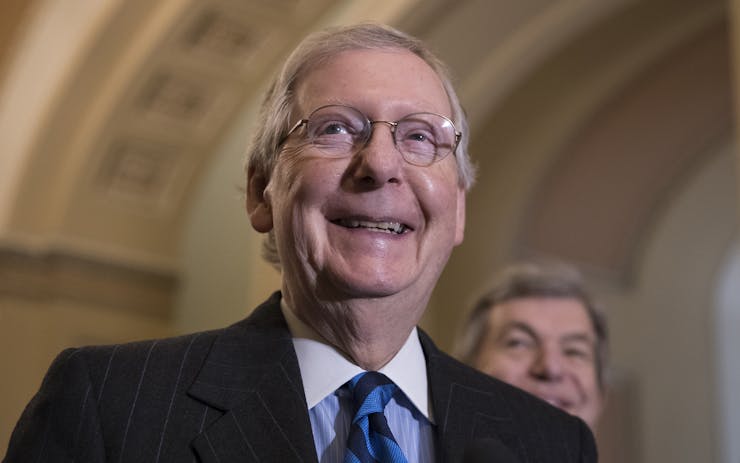Industrial hemp has the potential to give America’s struggling farmers a new means to support their families and invigorate the agricultural economy. But first, the federal government needs to get out of the way.
That’s according to US Senate Majority Leader Mitch McConnell (R-KY), who on Thursday introduced a bill that would legalize industrial hemp, the form of cannabis that contains little or no psychoactive THC. The bipartisan Hemp Farming Act of 2018 would remove industrial hemp from the federal Controlled Substances Act and eliminate obstacles around such issues as banking, insurance, and research.
“As I’ve traveled across Kentucky, I’ve spoken with farmers, manufacturers, and small business owners,” McConnell said on the Senate floor on Thursday. “Time and again, they shared with me their enthusiasm for hemp’s potential to reenergize agricultural communities and provide a new spark to the US economy. This bill will help make that potential a reality.”
It’s time the federal gov changes the way it looks at #hemp, which is why Senator @RonWyden and I, along with @SenJeffMerkley, are introducing legislation that will modernize federal law in this area & empower American farmers to explore this promising new market.
— Leader McConnell (@SenateMajLdr) April 12, 2018
While the measure wouldn’t affect medical or adult-use cannabis—which McConnell referred to as hemp’s “illicit cousin”—it would remove roadblocks that currently keep a lid on the longtime American industry. (Kentucky’s first recorded hemp crop dates back to 1775.)
Today, McConnell said, “around $600 million in hemp products are sold each year here in the US, but due to current laws, much of this hemp has to be imported. That cuts out our American farmers.”
Despite the industry’s size, which has grown as hemp seeds and fiber gain popularity with American consumers, hemp cultivation is forbidden in the US except under limited state research programs. McConnell’s bill would lift those and other restrictions, effectively treating hemp like any other agricultural product.
The top-ranking Senate Republican has been a supporter of his state’s hemp industry for some time. In 2014, he helped add language into a congressional farm bill to allow some hemp production in some states under temporary pilot programs. Since then, Kentucky has gone from zero hemp production to roughly 12,000 acres of cultivation.
“In Kentucky, hemp is producing useful across a wide variety of innovative products,” McConnell said. “Its fibers are being added to concrete and home insulation, its extracts are being researched for potential health benefits, and some breweries in Kentucky have even crafted hemp-infused beer.”
Last year alone, Kentucky’s nascent hemp industry added 81 jobs and brought in $16 million for farmers in the state, McConnell added. “That,” he stressed, “is just under Kentucky’s research pilot program—and of course that’s just one state.”
Shop highly rated dispensaries near you
Showing you dispensaries nearJoining McConnell in introducing the bill were Sens. Ron Wyden (D-OR) and Jeff Merkley (D-OR).
“It is far past time for Congress to pass this commonsense, bipartisan legislation to end the outrageous anti-hemp, anti-farmer and anti-jobs stigma that’s been codified into law and is holding back growth in American agriculture jobs and our economy at large,” Wyden said in a statement.
Glad to introduce the #HempFarmingAct. Oregon farmers should be allowed to grow the hemp that goes into the products you can buy at your local supermarket. https://t.co/CRWDmzWQv6
— Ron Wyden (@RonWyden) April 12, 2018
Merkely agreed. “If we’re selling hemp products in the United States,” he said simply, “we should be growing hemp in the United States—it’s good for jobs, good for our communities, and it’s just common sense.”
Under the Hemp Farming Act, states would become the primary regulators of hemp production, provided they establish plans to monitor and regulate its production. For states that fail to establish such systems, the US Department of Agriculture would provide oversight.
Jacob Graves, a 92-year-old Kentucky farmer who grew hemp in the state nearly 50 years ago, has been pushing for years to loosen restrictions on hemp production. “Hemp was a mainstay of our farm’s rotation throughout the 1800s, when Kentucky has known as the Hemp Capital of the World,” he said in a statement. “It was grown primarily for fiber in those days. The value of hemp for food and medicine (CBD) was largely unknown.”
Andrew Graves, Jacob’s son, is now the chairman of Atalo Holdings, a permitted grower under Kentucky’s current pilot program. “The hemp market is expected to surpass $2 billion by 2022 for CBD alone,” he said in a statement. “We’re ready to scale up, and Senator McConnell’s filing of the Hemp Farming Act of 2018 is a huge step in that direction.”






